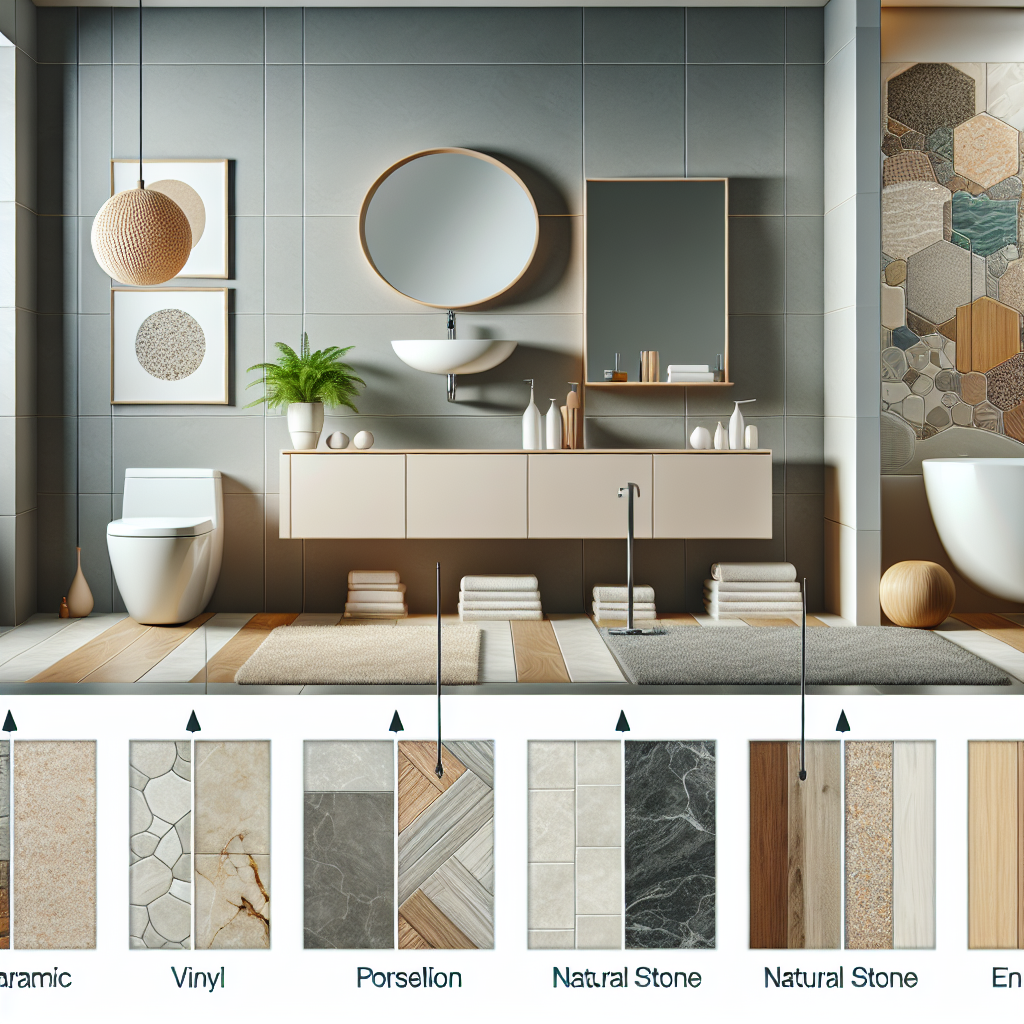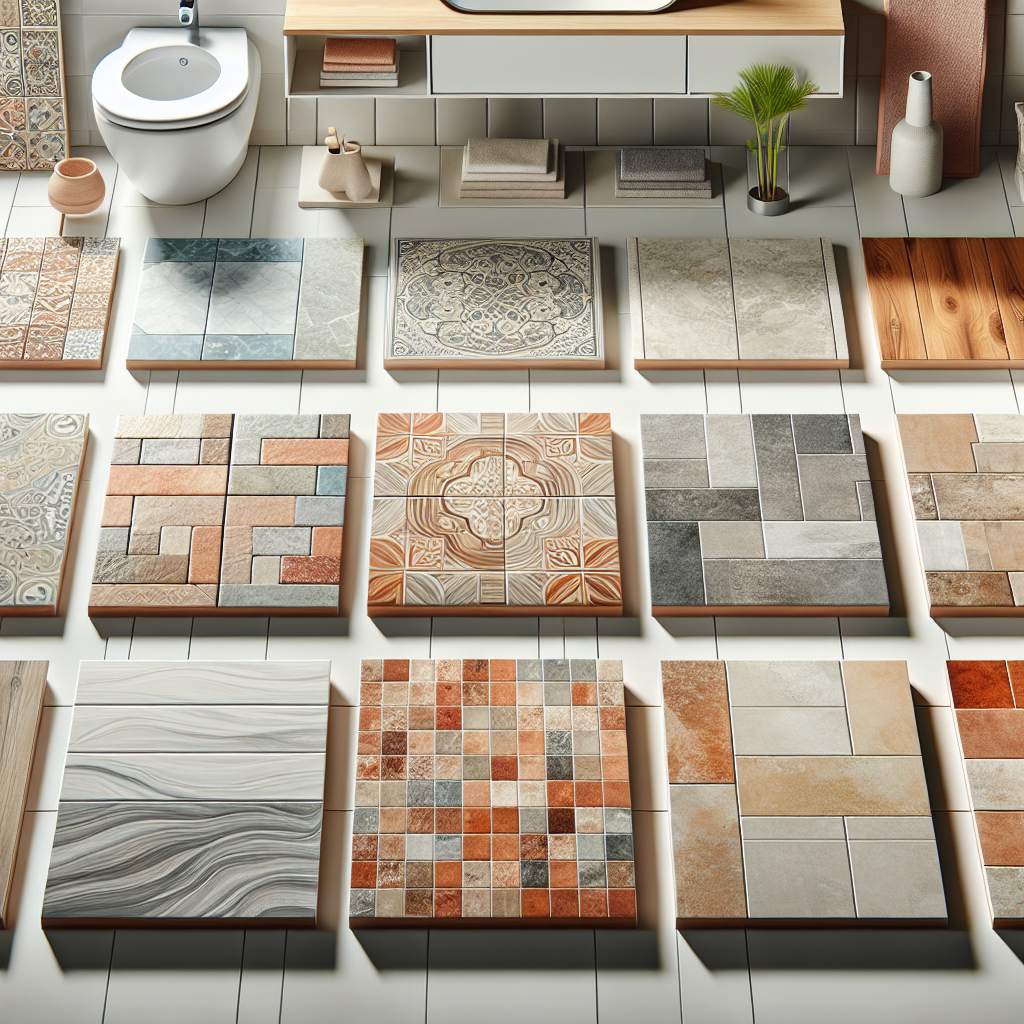Flooring Materials for the Bathroom

The bathroom is one of the most frequently used rooms in any home, and it is important to choose the right flooring material that can withstand the unique challenges of this space. From moisture and humidity to frequent foot traffic, the bathroom requires a flooring material that is not only durable but also aesthetically pleasing. In this article, we will explore different flooring materials suitable for the bathroom, their pros and cons, and provide valuable insights to help you make an informed decision for your bathroom renovation or construction project.
Tile Flooring
Tile flooring is a popular choice for bathrooms due to its durability, water resistance, and wide range of design options. Ceramic and porcelain tiles are the most common types of tile flooring used in bathrooms. They are both made from clay and fired at high temperatures, but porcelain tiles are denser and less porous than ceramic tiles, making them more resistant to water and stains.
Pros of Tile Flooring:
- Water-resistant: Tiles are highly resistant to water, making them ideal for bathrooms where moisture is a concern.
- Durable: Tile flooring can withstand heavy foot traffic and is resistant to scratches and stains.
- Design versatility: Tiles come in a wide variety of colors, patterns, and textures, allowing you to create a unique and personalized bathroom design.
- Easy to clean: Tiles are easy to clean and maintain, requiring only regular sweeping and occasional mopping.
Cons of Tile Flooring:
- Cold underfoot: Tile flooring can feel cold, especially during colder months. However, this can be mitigated by installing radiant floor heating.
- Hard and slippery: Tiles can be hard and slippery, which can be a concern for young children and older adults. Using textured or non-slip tiles can help address this issue.
- Grout maintenance: The grout lines between tiles can be prone to staining and require regular cleaning and maintenance.
Vinyl Flooring
Vinyl flooring is another popular choice for bathrooms due to its affordability, water resistance, and ease of installation. It is available in sheet, tile, or plank form, and offers a wide range of design options, including patterns that mimic the look of natural materials like wood or stone.
Pros of Vinyl Flooring:
- Waterproof: Vinyl flooring is highly resistant to water, making it suitable for bathrooms where moisture is a concern.
- Affordable: Vinyl flooring is generally more affordable than other flooring options, making it a budget-friendly choice for bathroom renovations.
- Comfortable underfoot: Vinyl flooring has a softer and warmer feel compared to tile or stone, making it more comfortable to walk on.
- Easy to install: Vinyl flooring can be installed as a floating floor, which means it can be laid directly over the existing subfloor without the need for adhesive.
Cons of Vinyl Flooring:
- Not as durable as tile: While vinyl flooring is durable, it is not as resistant to scratches and dents as tile flooring.
- Not eco-friendly: Vinyl flooring is made from synthetic materials and is not biodegradable, which may be a concern for environmentally conscious homeowners.
- Can fade over time: Vinyl flooring may fade when exposed to direct sunlight over an extended period.
Natural Stone Flooring
Natural stone flooring, such as marble, granite, or limestone, can add a touch of elegance and luxury to any bathroom. These materials are known for their durability and timeless beauty, making them a popular choice for high-end bathroom designs.
Pros of Natural Stone Flooring:
- Luxurious appearance: Natural stone flooring adds a sophisticated and high-end look to any bathroom.
- Durable: Natural stone is highly durable and can withstand heavy foot traffic.
- Unique patterns: Each piece of natural stone has its own unique patterns and variations, creating a one-of-a-kind look.
- Increases property value: Installing natural stone flooring in your bathroom can increase the value of your home.
Cons of Natural Stone Flooring:
- Expensive: Natural stone flooring is generally more expensive than other flooring options, making it less budget-friendly.
- Requires regular maintenance: Natural stone flooring requires regular sealing and maintenance to prevent staining and damage.
- Can be slippery: Some types of natural stone, such as polished marble, can be slippery when wet. Using textured or honed finishes can help improve traction.
- Sensitive to acidic substances: Natural stone can be damaged by acidic substances, such as certain cleaning products or toiletries. It is important to use pH-neutral cleaners specifically designed for natural stone.
Laminate Flooring
Laminate flooring is a synthetic flooring material that consists of multiple layers, including a photographic layer that mimics the look of wood, stone, or tile. It is a cost-effective alternative to natural materials and offers easy installation and maintenance.
Pros of Laminate Flooring:
- Affordable: Laminate flooring is generally more affordable than natural materials like hardwood or stone.
- Easy to install: Laminate flooring can be installed as a floating floor, which means it can be laid directly over the existing subfloor without the need for adhesive.
- Durable: Laminate flooring is resistant to scratches, stains, and fading, making it suitable for high-traffic areas like bathrooms.
- Wide range of designs: Laminate flooring comes in a variety of designs and patterns, allowing you to achieve the look of natural materials at a lower cost.
Cons of Laminate Flooring:
- Moisture sensitivity: While laminate flooring is water-resistant, it is not waterproof. Prolonged exposure to moisture can cause the planks to warp or swell.
- Cannot be refinished: Unlike hardwood flooring, laminate flooring cannot be sanded or refinished to remove scratches or damage. If a plank is damaged, it needs to be replaced.
- Not as authentic as natural materials: While laminate flooring can mimic the look of natural materials, it may not have the same authentic feel or texture.
Frequently Asked Questions about “Flooring Materials for the Bathroom”
1. What is the best flooring material for a bathroom?
The best flooring material for a bathroom depends on various factors, including your budget, design preferences, and the level of moisture in your bathroom. Tile flooring, such as ceramic or porcelain tiles, is a popular choice due to its water resistance and durability. Vinyl flooring is also a good option as it is affordable, water-resistant, and easy to install. Natural stone flooring adds a luxurious touch but comes at a higher cost. Ultimately, the best flooring material for your bathroom will depend on your specific needs and preferences.
2. Can hardwood flooring be used in a bathroom?
While hardwood flooring can add warmth and beauty to a bathroom, it is generally not recommended due to its susceptibility to moisture damage. Bathrooms are high-moisture areas, and prolonged exposure to water can cause hardwood flooring to warp, swell, or develop mold and mildew. However, if you still want the look of hardwood in your bathroom, engineered hardwood flooring, which is made with a top layer of real wood and a plywood or high-density fiberboard core, can be a more suitable option as it is more resistant to moisture.
3. How can I make my bathroom flooring less slippery?
To make your bathroom flooring less slippery, you can take several measures:
- Choose textured or non-slip tiles: Opt for tiles with a textured surface or non-slip coating to improve traction.
- Use rugs or bath mats: Place rugs or bath mats with non-slip backing near the shower or bathtub to provide additional grip.
- Apply anti-slip treatments: There are various anti-slip treatments available that can be applied to the surface of your flooring to increase traction.
- Keep the floor dry: Wipe up any water or spills immediately to prevent the floor from becoming slippery.
4. How do I maintain and clean tile flooring in the bathroom?
To maintain and clean tile flooring in the bathroom, follow these tips:
- Sweep or vacuum regularly to remove dirt and debris.
- Wipe up spills promptly to prevent staining.
- Use a pH-neutral cleaner specifically designed for tile flooring.
- Avoid using abrasive cleaners or tools that can scratch the tiles or damage the grout.
- Periodically clean the grout lines using a grout cleaner and a brush.
- Consider sealing the grout lines to protect them from staining and discoloration.
5. Can I install radiant floor heating under my bathroom flooring?
Yes, radiant floor heating can be installed under various types of bathroom flooring, including tile, vinyl, and laminate. Radiant floor heating provides a comfortable and energy-efficient way to heat your bathroom, as it warms the floor from below, creating a cozy environment. However, it is important to consult with a professional to ensure that the chosen flooring material is compatible with radiant floor heating and that the installation is done correctly.
Summary
Choosing the right flooring material for your bathroom is crucial to create a functional and visually appealing space. Tile flooring, such as ceramic or porcelain tiles, offers water resistance, durability, and design versatility. Vinyl flooring is affordable, water-resistant, and easy to install. Natural stone flooring adds a touch of luxury but comes at a higher cost and requires regular maintenance. Laminate flooring provides a cost-effective alternative to natural materials and offers durability and a wide range of designs. Consider your budget, design preferences, and the level of moisture in your bathroom when selecting the flooring material that best suits your needs. Remember to consult with professionals, such as North Bay Contractors, for expert advice and installation.

